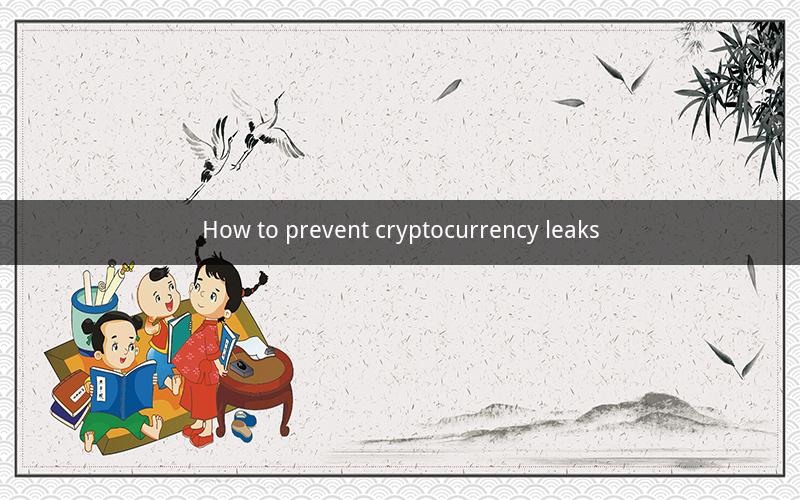
Cryptocurrency Leak Prevention: A Comprehensive Guide
Table of Contents
1. Introduction to Cryptocurrency Leaks
2. Understanding the Risks
3. Common Causes of Cryptocurrency Leaks
4. Best Practices for Preventing Leaks
4.1 Use of Secure Wallets
4.2 Implementing Multi-Factor Authentication
4.3 Regularly Updating Security Software
4.4 Educating Users on Security Measures
4.5 Conducting Security Audits
5. Advanced Techniques for Leak Prevention
5.1 Implementing Blockchain Analytics
5.2 Employing Smart Contracts
5.3 Using Cryptocurrency Insurance
5.4 Engaging with the Community
6. Conclusion
7. FAQs
1. Introduction to Cryptocurrency Leaks
Cryptocurrency leaks refer to the unauthorized access or disclosure of private keys, passwords, or other sensitive information related to digital currencies. With the increasing popularity of cryptocurrencies, the risk of leaks has also grown significantly. As a result, it is crucial to understand how to prevent such leaks to safeguard your assets.
2. Understanding the Risks
Cryptocurrency leaks can lead to several risks, including:
- Financial Loss: Unauthorized access to your cryptocurrency can result in the theft of your funds.
- Identity Theft: Leaked personal information can be used to commit identity theft.
- Reputation Damage: Leaks can damage your reputation as a cryptocurrency user or investor.
- Legal Consequences: Depending on the jurisdiction, leaking sensitive information may lead to legal action.
3. Common Causes of Cryptocurrency Leaks
Several factors can contribute to cryptocurrency leaks:
- Weak Passwords: Using weak passwords or reusing them across multiple platforms increases the risk of leaks.
- Phishing Attacks: Cybercriminals often use phishing techniques to trick users into revealing their sensitive information.
- Malware: Malware, such as keyloggers or spyware, can be used to steal your private keys and passwords.
- Insecure Networks: Using public Wi-Fi networks without a VPN can expose your sensitive information to hackers.
- Social Engineering: Cybercriminals may manipulate individuals into revealing their sensitive information through social engineering tactics.
4. Best Practices for Preventing Leaks
4.1 Use of Secure Wallets
Storing your cryptocurrencies in a secure wallet is essential to prevent leaks. Consider the following types of wallets:
- Hardware Wallets: These wallets store your private keys offline, making them more secure against online threats.
- Software Wallets: Choose reputable software wallets with strong security features and regular updates.
- Paper Wallets: While not as convenient as digital wallets, paper wallets can be a secure way to store large amounts of cryptocurrency.
4.2 Implementing Multi-Factor Authentication
Multi-factor authentication (MFA) adds an extra layer of security to your cryptocurrency accounts. Ensure that your wallet and exchange accounts have MFA enabled to prevent unauthorized access.
4.3 Regularly Updating Security Software
Keep your computer and mobile devices protected with up-to-date antivirus and anti-malware software. Regular updates ensure that you are protected against the latest threats.
4.4 Educating Users on Security Measures
Educate yourself and others about best practices for cryptocurrency security. Stay informed about the latest threats and scams to avoid falling victim to them.
4.5 Conducting Security Audits
Regularly audit your cryptocurrency accounts and devices to ensure that they are secure. Look for signs of suspicious activity and take immediate action if any issues are detected.
5. Advanced Techniques for Leak Prevention
5.1 Implementing Blockchain Analytics
Blockchain analytics tools can help you monitor your cryptocurrency transactions for any unusual activity. This can help you detect and prevent leaks before they cause significant damage.
5.2 Employing Smart Contracts
Smart contracts are self-executing contracts with the terms of the agreement directly written into code. They can be used to automate and secure transactions, reducing the risk of leaks.
5.3 Using Cryptocurrency Insurance
Cryptocurrency insurance can provide financial protection in the event of a leak. Before purchasing insurance, ensure that the policy covers the specific risks you are concerned about.
5.4 Engaging with the Community
Stay active in cryptocurrency communities to share knowledge and stay updated on the latest developments. Engaging with the community can also help you identify potential leaks and report them to the appropriate authorities.
6. Conclusion
Preventing cryptocurrency leaks requires a combination of best practices, advanced techniques, and staying informed about the latest threats. By implementing these strategies, you can significantly reduce the risk of losing your cryptocurrency assets.
7. FAQs
Q1: Can I prevent cryptocurrency leaks entirely?
A1: While it is impossible to prevent leaks 100%, implementing the best practices and advanced techniques can significantly reduce the risk.
Q2: How can I tell if my cryptocurrency has been leaked?
A2: Monitor your transactions for any unusual activity and be aware of any unexpected password reset requests or unauthorized access to your accounts.
Q3: Are hardware wallets more secure than software wallets?
A3: Hardware wallets are generally considered more secure than software wallets since they store private keys offline.
Q4: Can I use the same password for multiple cryptocurrency accounts?
A4: No, using the same password for multiple accounts increases the risk of leaks. Use unique, strong passwords for each account.
Q5: What should I do if I suspect my cryptocurrency has been leaked?
A5: Change your passwords immediately, report the incident to your wallet provider or exchange, and monitor your accounts for any suspicious activity.
Q6: Are there any free tools available for monitoring cryptocurrency leaks?
A6: Yes, there are several free blockchain analytics tools available that can help you monitor your transactions for any unusual activity.
Q7: How can I keep my private keys secure?
A7: Store your private keys in a secure location, use strong passwords, and avoid sharing them with anyone.
Q8: Is it safe to use public Wi-Fi networks to access my cryptocurrency accounts?
A8: No, using public Wi-Fi networks without a VPN can expose your sensitive information to hackers.
Q9: How often should I update my antivirus software?
A9: It is recommended to update your antivirus software at least once a week to ensure that you are protected against the latest threats.
Q10: Can I trust cryptocurrency insurance policies?
A10: Before purchasing cryptocurrency insurance, research the provider and ensure that the policy covers the specific risks you are concerned about.